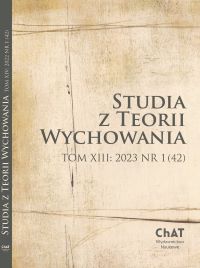Jakie wychowanie? Postawy społeczne i obywatelskie w podstawach programowych kształcenia ogólnego
What kind of education? Social and civic attitudes in the core curricula of general education
Author(s): Hanna Solarczyk-SzwecSubject(s): Social Sciences, Education
Published by: Wydawnictwo Naukowe ChAT
Keywords: core curriculum/a for general education; learning outcomes; attitudes; education
Summary/Abstract: The subject of the presented analysis is the core curricula of general education for all stages of education and compulsory education subjects in terms of the presence of learning outcomes related to attitudes within social and civic competences. This document was treated as an interpretation of the assumptions of the state about what kind of person should be formed by the Polish school. The presented results are part of a research project carried out at the Department of School Education at Nicolaus Copernicus University in Toruń in the years 2018-2021. The research consisted in analysing existing sources (core curricula) using the quantitative and qualitative approaches. This article asks the question about what vision of education emerges from the core curricula of general education. The analysis of general and specific requirements makes it possible to formulate a fundamental conclusion that the attitudes and values characteristic of a conservative vision of education, focusing on the nation/Poland and tradition, are promoted in the core curriculum of general education, and by the absence of such notions as solidarity, justice, and equality education is given an excluding direction. On the other hand, the domination of reconstructive and adaptive attitudes among the learning outcomes may lead to passivity in social life. Przedmiotem prezentowanej analizy są podstawy programowe kształcenia ogólnego dla wszystkich etapów kształcenia i przedmiotów nauczania obowiązkowego pod kątem występowania w nich efektów uczenia się związanych z postawami w obrębie kompetencji społecznych i obywatelskich. Dokument ten potraktowano jako wykładnię założeń państwa na temat tego, jakiego człowieka powinna ukształtować polska szkoła. Prezentowane wyniki są częścią projektu badawczego realizowanego w Katedrze Pedagogiki Szkolnej Uniwersytetu Mikołaja Kopernika w Toruniu w latach 2018-2021. Badanie polegało na analizie źródeł zastanych (podstaw programowych) przy zastosowaniu podejścia ilościowego i jakościowego. W niniejszym artykule postawiono pytanie o to, jaka wizja wychowania wyłania się z podstaw programowych kształcenia ogólnego? Analiza wymagań ogólnych i szczegółowych pozwala sformułować zasadniczy wniosek, że w podstawie programowej kształcenia ogólnego promuje się postawy i wartości charakterystyczne dla konserwatywnej wizji wychowania, koncentrującej się na narodzie/ Polsce i tradycji, a przez nieobecność w wymaganiach szczegółowych takich pojęć jak: solidarność, sprawiedliwość, równość nadaje się wychowaniu ekskluzyjny kierunek. Natomiast dominacja efektów uczenia się postaw o charakterze rekonstrukcyjno-adaptacyjnym może prowadzić do bierności w życiu społecznym.
Journal: Studia z Teorii Wychowania
- Issue Year: XIV/2023
- Issue No: 1 (42)
- Page Range: 65-84
- Page Count: 20
- Language: Polish

